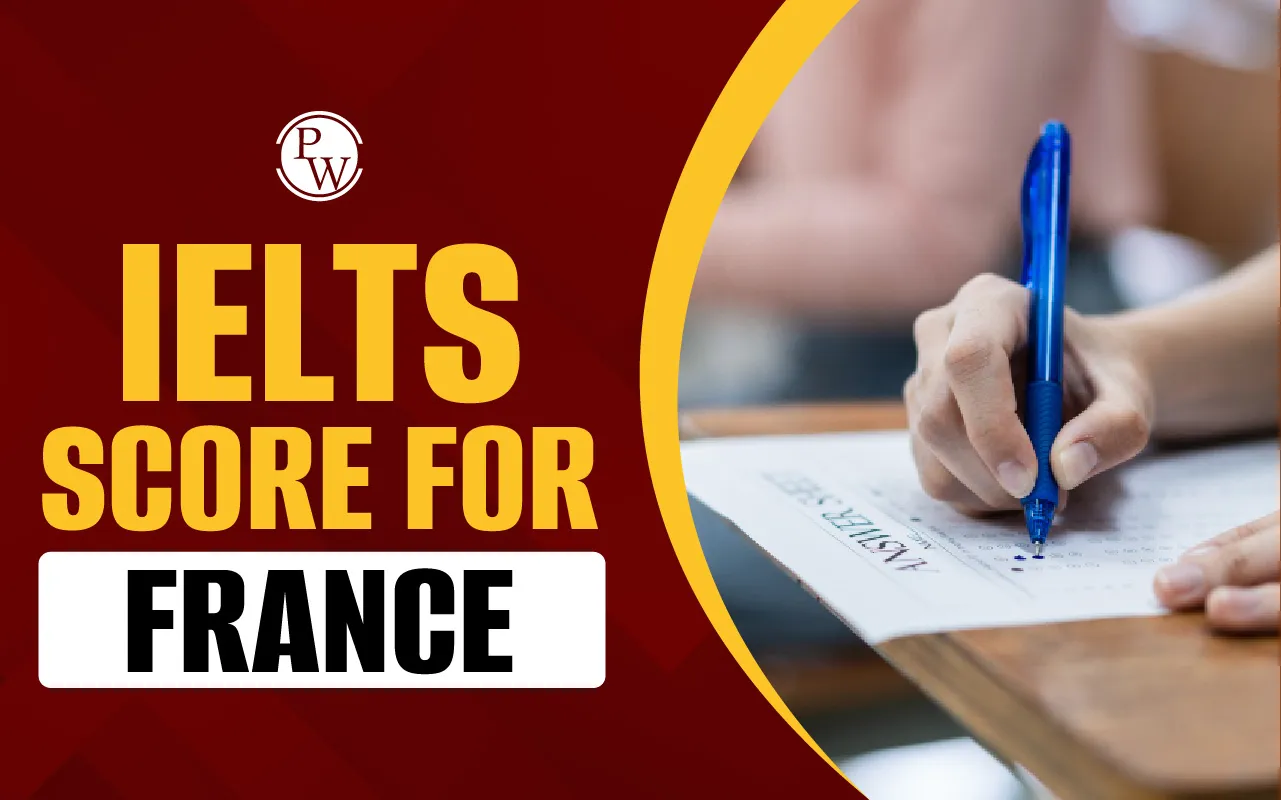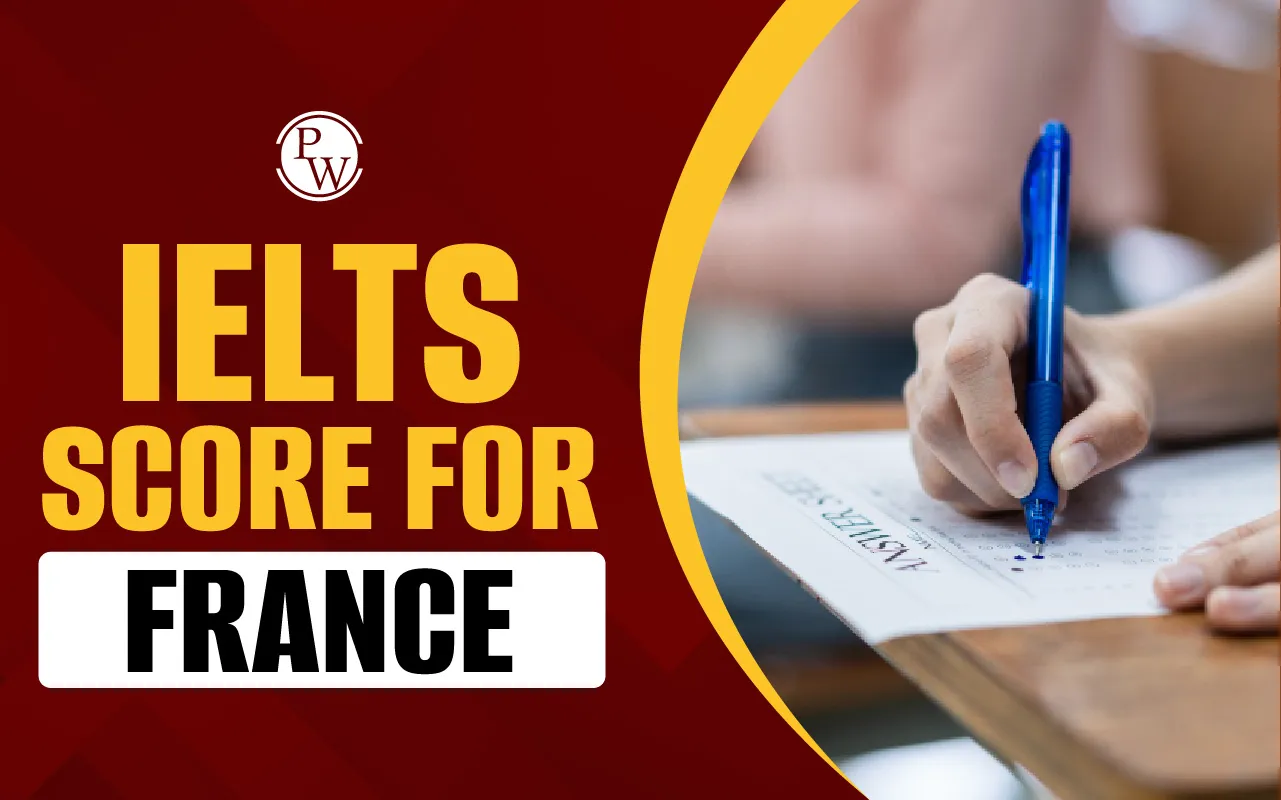

IELTS Score for France: If you are planning to study in France, knowing the required IELTS score is important. Most French universities offering English-taught programs ask for an overall IELTS band of 6.0 to 7.0, depending on the course and level of the student.
The Bachelor’s programs usually need around 6.0, while top master’s or MBA programs may require 6.5 or higher. Although the French student visa doesn’t directly require IELTS, universities use it to assess your English proficiency. A good IELTS score not only boosts your admission chances but also helps you communicate confidently once you start studying in France.
IELTS Score for France
The IELTS (International English Language Testing System) is one of the most widely accepted English proficiency tests in the world for students as well as professionals. It checks your skills in Listening, Reading, Writing, and Speaking.
France, although a French-speaking country, has hundreds of English-taught programs at top universities - especially at the master’s and MBA levels. These programs are meant for international students, so universities use IELTS scores to ensure you can comfortably study and communicate in English.
Basically IELTS Score for France:
-
IELTS is proof of your English language ability. I.e., if your English is good, you can easily communicate with people in other countries.
-
It is required for English-taught courses in France.
-
It may also help during your student visa application, though it’s not mandatory for visas in most cases.
Is IELTS Mandatory to Study in France?
-
If you apply to a French-taught program, you don’t need IELTS. Instead, you might need a French language test like DELF, DALF, or TCF.
-
If you apply to an English-taught program, you usually need to provide proof of English proficiency — and IELTS is one of the most common ways to do that.
-
Some universities might waive IELTS if you studied your previous degree in English medium or if your education was completely in English.
So technically, you can study in France without IELTS — but only if the university accepts other forms of proof or conducts its own English test/interview.
Minimum IELTS Score Required for France
Different universities and programs have different IELTS requirements. Generally, the minimum IELTS score for France depends on the level of study and type of program.
|
Minimum IELTS Score Required for France |
||
|
Level of Study |
Minimum IELS Overall Score |
Band Requirements |
|
Undergraduate (Bachelor’s) |
6.0 – 6.5 |
No band less than 5.5 or 6.0 |
|
Postgraduate (Master’s) |
6.5 – 7.0 |
Some top programs may ask for 7.0 overall |
|
MBA / Elite Programs |
7.0 – 7.5 |
Especially for business or management schools |
|
Foundation / Pathway Programs |
5.5 – 6.0 |
May allow lower scores with extra English training |
In simple terms:
If you score 6.5 or above, you’ll be eligible for most English-taught programs in France.
If you’re aiming for top universities or MBA courses, target 7.0 or higher.
IELTS Score for Top Universities in France
To give you a better idea, here’s what some well-known French universities usually expect from international students for English-taught courses:
|
IELTS Score for Top Universities in France |
||
|
University |
Recommended IELTS Score |
Course Type |
|
HEC Paris |
6.5 – 7.0 |
Business, Management |
|
ESSEC Business School |
6.5 – 7.0 |
MBA, Global Management |
|
INSEAD |
7.0 – 7.5 |
MBA, Executive MBA |
|
Sciences Po |
6.5 |
International Relations, Economics |
|
Sorbonne University |
6.0 – 6.5 |
Undergraduate & Master’s |
|
Université Paris-Saclay |
6.5 |
Engineering, Science |
|
Grenoble Ecole de Management |
6.5 – 7.0 |
Business, Analytics |
|
Skema Business School |
6.0 – 6.5 |
International Business |
|
Toulouse Business School |
6.0 |
MBA, Management |
|
Schiller International University |
6.0 |
Bachelor’s, Master’s |
Most of these universities offer both English and French programs, so always check if your chosen program is taught in English before planning your IELTS.
IELTS Score for French Student Visa
Here’s something many students get confused about — you don’t need IELTS to apply for a France student visa.
The French Embassy or Campus France usually focuses on:
-
Your university admission letter (proof you’ve been accepted)
-
Financial proof
-
Accommodation details
-
Academic transcripts
If your university accepts your IELTS (or an equivalent English certificate), that’s enough. You don’t have to submit IELTS separately for the visa process. The main goal is to show that you can study in the language your program is taught in.
So, IELTS is mainly for university admission, not for visa approval.
Can Indian Students Study in France Without IELTS?
Yes, Indian students can study in France without IELTS, especially if:
-
Your previous education was in the English medium.
-
You have a certificate from your school or college stating that your Medium of Instruction (MOI) was English.
-
The university conducts an online interview to test your English skills.
-
You enroll in a foundation course that includes English language preparation.
Some universities in France that may allow admission without IELTS (based on other proofs) include:
-
Toulouse Business School
-
ISC Paris
-
EBS Paris
-
EPITA School of Engineering and Computer Science
-
American Business School, Paris
Note - However, remember that not all programs waive IELTS, and it’s always better to have a valid IELTS score. It increases your acceptance chances and shows your commitment to studying abroad.
Section-Wise IELTS Requirements for France
When universities mention an IELTS score, they look at both your overall band score and individual section scores. Each section — Listening, Reading, Writing, and Speaking — is scored from 0 to 9.
Here is what most universities in France expect from the students:
|
Section-Wise IELTS Requirements for France |
|
|
Section |
Minimum Band Score (Typical) |
|
Listening |
6.0 |
|
Reading |
6.0 |
|
Writing |
6.0 |
|
Speaking |
6.0 |
|
Overall |
6.5 or above |
Note - Some universities are flexible and accept a slightly lower score (like 5.5 in one section) as long as the overall average is 6.5. But for top programs, especially MBA or Engineering courses, maintaining consistency across all four sections is important.
Why IELTS Is Important for Studying in France
Even though France is famous for its French culture and language, the number of English-taught courses has grown massively in the past decade. Here is why having a good IELTS score helps:
-
It strengthens your application:
A solid IELTS score shows the admissions committee that you can handle lectures, discussions, and research in English. -
It helps you get scholarships:
Some merit-based scholarships for international students in France prefer students with strong English skills. This is very important for the students. -
It boosts your confidence:
Once you’re in France, you’ll interact with professors and classmates in English. IELTS ensures you’re ready for that. -
It’s valid worldwide:
Even if you change your study plans later, IELTS is accepted in almost every country for higher education.
IELTS Score Validity and Attempts
Your IELTS score is valid for two years from your test date. So, if you take IELTS in January 2025, it will be valid until January 2027.
You can also retake the IELTS as many times as you like. Many students take it two or three times to improve their scores. There’s no penalty for retaking — only the cost and time involved.
Tips to Get a Good IELTS Score for France
If your dream is to study in France, and you’re aiming for that perfect IELTS score, here are some easy-to-follow tips:
1. Know the exam format
Understand what kind of questions appear in Listening, Reading, Writing, and Speaking. The more familiar you are with the format, the less nervous you’ll be.
2. Practice with real IELTS papers
Use official IELTS materials or mock tests to get a feel for the timing and question style.
3. Focus on your weak areas
If Writing or Speaking is your weak point, spend extra time improving them. Record yourself speaking and ask for feedback.
4. Learn vocabulary by topic
French universities often prefer strong academic writing. So, build your vocabulary around education, environment, technology, and social issues.
5. Improve your grammar naturally
Read articles, watch English shows, and observe how sentences are formed. Avoid cramming grammar rules. Just focus on grammar rules.
6. Simulate test conditions
Take full mock tests under timed conditions. This helps you manage stress and finish tasks on time.
7. Get feedback from teachers or peers
Have someone check your essays or conduct mock interviews. Constructive criticism can help you improve quickly.
8. Stay consistent
Studying for IELTS for just one week won’t help much. Aim for 4–8 weeks of focused practice to see visible improvement.
How to Choose Your IELTS Target Score
Your target IELTS score depends on your goals.
|
How to Choose Your IELTS Target Score |
|
|
Goal |
Recommended IELTS Score |
|
English-taught Bachelor’s Program |
6.0 – 6.5 |
|
English-taught Master’s Program |
6.5 – 7.0 |
|
MBA / Executive Program |
7.0 – 7.5 |
|
Scholarship Applications |
7.0 or above |
|
Foundation or Pre-Master’s |
5.5 – 6.0 |
Note - It’s always smart to aim 0.5 band higher than the requirement. For example, if your university asks for 6.5, aim for 7.0 to be safe.
IELTS vs. Other English Tests in France
Apart from IELTS, many universities in France also accept:
-
TOEFL iBT
-
PTE Academic
-
Cambridge English Tests
Still, IELTS remains the most popular and widely accepted choice. It is recognized by almost every French university that offers English-taught courses for the candidates.
